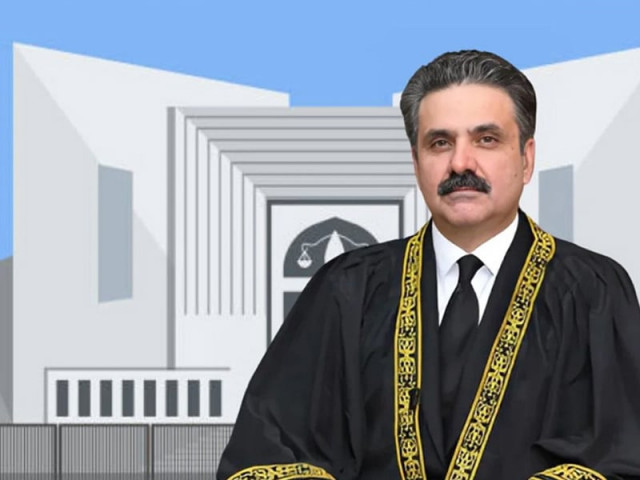Signs of healing as CJ convenes full court
Apex court okays Shah's case management plan, barring ad hoc judges, all justices attend the meeting

In what appears to be a sign of the healing of divisions that marred the term of former chief justice of Pakistan Qazi Faez Isa, all the judges of the Supreme Court on Monday agreed to implement a case management plan devised by Justice Syed Mansoor Ali Shah for disposal of cases.
Justice Shah, the SC's senior puisne judge, was supposed to become the new chief justice of Pakistan but was superseded by Justice Yahya Afridi after a change in the CJ's selection procedure through the 26th Constitutional Amendment, hurriedly passed ahead of Justice Isa's retirement.
During Justice Isa's tenure the apex court stood bitterly divided with Justice Shah not only not attending CJ Isa's farewell reference, along with four other judges, but also launching a scathing criticism of the former chief justice in a letter sent to the SC registrar on the day of Isa's retirement.
However, upon taking charge, the new chief justice, Justice Afridi, reconstituted the three-member SC committee that forms benches and lists cases by re-inducting Justice Munib Akhar, who was removed from the committee by Justice Isa after a presidential ordinance.
Justice Afridi also convened a full court meeting specifically to assess performance of Supreme Court and disposal of cases, focusing on measures to reduce case backlog and enhance judicial efficiency.
All SC judges excluding two additional judgesJustice Sardar Tariq Masood and Justice Mazhar Alam Miankhelattended the meeting. SC senior puisne judge Syed Mansoor Ali Shah, who is currently in Saudi Arabia, participated in the discussion through video-link.
In the meeting, the apex court took stock of the pending cases and deliberated over ways to clear that backlog through better management and use of modern technology.
The SC registrar, Jazeela Aslam, provided an overview of the current caseload and outlined the steps toward timely decision of cases. She presented updated statistics, indicating that 59,191 cases are currently pending.
She also introduced a newly devised one-month plan based on Case Management Plan 2023 prepared by Justice Syed Mansoor Ali Shah. The plan includes setting clear standards and employing information technology to effectively manage all categories of cases.
Reviewing the plan, the judges discussed a range of strategies to achieve its targets. Criminal and civil cases, as detailed in the monthly plan, were allocated to specialized two- and three-member benches to ensure swift and speedy case resolution.
According to a statement issued after the meeting by the SC public relations officer, the judges contributed valuable insights and recommendations for further system improvement, underscoring their commitment to addressing case backlog.
Justice Shah offered additional suggestions aimed at reducing the case backlog and improving procedural efficiency initially for one month and followed by three-month and six-month plans.
Chief Justice Afridi thanked all the judges for their resolve to implement the case management plan, with a commitment to achieve the outlined targets. The SC will convene another full court meeting on December 2 to review progress in reduction of caseload.
CJ's first day at work
On his first day as Chief Justice of Pakistan, Justice Yahya Afridi heard a total of 30 cases on Monday.
He led a division bench comprising Justice Shahid Bilal Hassan in Courtroom 1 of the Supreme Court building. The court heard 24 cases from 9:30 am to 10:40 am. Six cases were postponed until 11:30 due to the absence of lawyers or parties involved.
Most appeals before the court were time-barred. In a property dispute case, the court waived the time-bar objection due to the petitioner being a widow. After the recess, the court reconvened to decide the remaining six cases.



















COMMENTS
Comments are moderated and generally will be posted if they are on-topic and not abusive.
For more information, please see our Comments FAQ